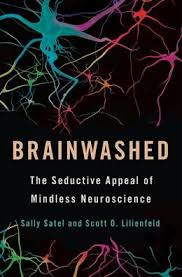 Brainwashed: The Seductive Appeal of Mindless Neuroscience, a new book by psychiatrist Sally Satel and psychologist and professor Scott O. Lilienfeld, argues that current real-world applications of neuroscience may be misguided and even harmful.
Brainwashed: The Seductive Appeal of Mindless Neuroscience, a new book by psychiatrist Sally Satel and psychologist and professor Scott O. Lilienfeld, argues that current real-world applications of neuroscience may be misguided and even harmful.
“Never before has the brain so vigorously engaged the public imagination,” the authors write in the book’s introduction, a development that both delights and dismays them, as much of what enters the popular discussion, they argue, “offers facile and overly mechanistic explanations for complicated behaviors.”
The book goes on to consider current neuroscientific capabilities, their uses, and, crucially, their limitations.
Satel is a resident scholar at the American Enterprise Institute for Public Policy Research, a lecturer at Yale University School of Medicine, and a practicing psychiatrist. Lilienfeld is a clinical psychologist and professor of psychology at Emory University.
CLBB faculty Steven E. Hyman and Jeffrey Rosen have endorsed Brainwashed: The Seductive Appeal of Mindless Neuroscience:
“Satel and Lilienfeld have produced a remarkably clear and important discussion of what today’s brain science can and cannot deliver for society. As a neuroscientist, I confess that I also enjoyed their persuasive skewering of hucksters whose misuse of technology in the courtroom and elsewhere is potentially damaging not only to justice but also to the public understanding of science.”—Dr. Steven E. Hyman, Director of the Stanley Center for Psychiatric Research at the Broad Institute of MIT and Harvard
“Brainwashed challenges the much-hyped claim that neuroscience will transform everything from marketing to the legal system to our ideas of blameworthiness and free will. Satel and Lilienfeld bring much needed skeptical intelligence to this field, giving neuroscience its due while recognizing its limitations. This is an invaluable contribution to one of our most contested debates about the ability of science to transform society.”—Jeffrey Rosen, Professor of Law, George Washington University and Legal Affairs Editor, The New Republic


 Brainwashed: The Seductive Appeal of Mindless Neuroscience, a new book by psychiatrist Sally Satel and psychologist and professor Scott O. Lilienfeld, argues that current real-world applications of neuroscience may be misguided and even harmful.
Brainwashed: The Seductive Appeal of Mindless Neuroscience, a new book by psychiatrist Sally Satel and psychologist and professor Scott O. Lilienfeld, argues that current real-world applications of neuroscience may be misguided and even harmful.
